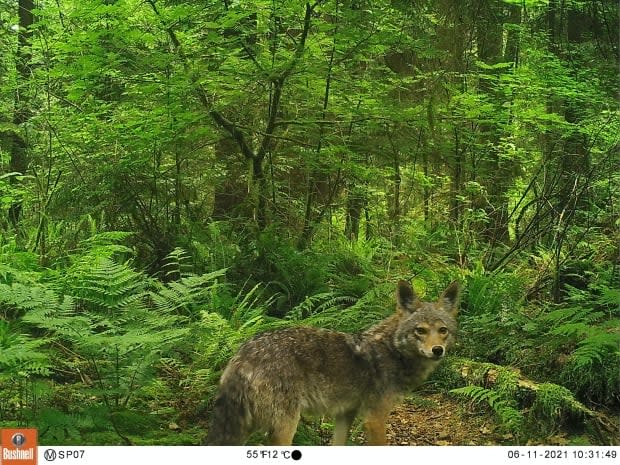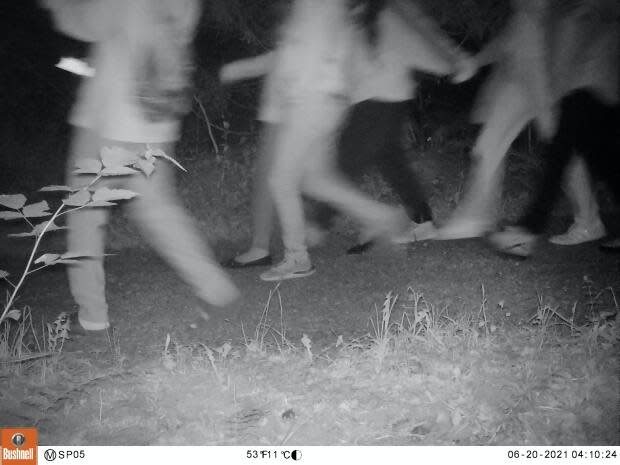After-hours partying, garbage in Vancouver's Stanley Park contributing to coyote attacks: researcher

A University of British Columbia wildlife researcher hopes Vancouver will do more to manage garbage and late-night visits to the city's biggest park as part of the solution to dozens of aggressive coyote attacks over the past eight months.
Kristen Walker, a wildlife biologist with UBC's Faculty of Land and Food Systems, is part of a team that put ground-level motion-sensor cameras around the four square-kilometre Stanley Park in January. The team's goal is to better identify the coyotes, which have lived in the park for decades and are most active between dusk and dawn.
"It's highly unusual, this is behaviour we have not seen from coyotes around the world," Walker said.
"It is unprecedented."
Images from the cameras Walker and her team set up are helping to identify just how many coyotes live in the park and provide more insight into their behaviour. In the past, ecologists believed around a dozen coyotes lived there, but those numbers have not been verified.

While picking up images of the animals, the cameras have also captured people in the park in the middle of the night and garbage being left behind.
Researchers are still working on the data, but Walker believes the after-hours park use, garbage and even toxins such as alcohol from discarded containers could be contributing to the aggressive behaviour from the coyotes toward humans.
Walker thinks the coyotes could be reaching a threshold.
"We know that people have been feeding animals in the park. So that is contributing," she said. "I think this is a compounded issue."
The Vancouver Park Board estimates there are up to 10 million visits a year to Stanley Park. It's within walking or biking distance of several downtown neighbourhoods and features a paved seawall, beaches, forested areas, trails and natural meadows.
A steady string of coyote bites on humans began in December.
The aggressive attacks have at times closed sections of the park and resulted in the province's Conservation Officer Service trapping and euthanizing six coyotes.
In July, a two-year old girl was taken to hospital after she was bitten by a coyote near the Vancouver Aquarium on a Monday evening while walking with her family.
On Saturday night the B.C. Conservation Officer Service said on social media that there had been yet another attack. Officers said a woman was scratched on her upper back and shoulders after a coyote came up from behind her on the east side of the park around 10 p.m.
The previous incident happened on July 22, when the Park Board said a man was attacked between the aquarium and Brockton Oval — a track and rugby pitch in the park.
Conservation officers have warned people to use the park at their own peril.
Walker says euthanizing coyotes will not solve the problem because other coyotes, which are plentiful across Metro Vancouver, will move into the area. She also worries that it's a difficult task for conservation officers to accurately target the coyotes responsible for the attacks.
"The coyotes' behaviour is abnormal and it's unacceptable," she said. "But we need to get at the root cause of the problem."

The Conservation Officer Service said that it is making efforts to only trap coyotes in specific areas, to minimize the chances of catching a coyote not involved in aggressive attacks.
Officers said that any coyotes captured that do not match the profile of an animal involved in a reported attack will be released.
Walker wants the Vancouver Park Board to increase patrols in the park to reduce the number of people there overnight. Walker also wants the park board to install tamper-proof garbage cans to keep coyotes and rodents, which can attract more coyotes, from eating waste.
She says the park board should also invest in programs that would safely train coyotes to avoid humans.
"I think there needs to be a more immediate response for the sake of the humans that are involved with being bitten and for the sake of no more coyotes dying," Walker said.
No one cause
The Vancouver Park Board says it's considering all of Walker's suggestions, but is still working to pinpoint all the factors causing the aggressive behaviour.
"I don't think there is one single cause," said Chad Townsend, a senior environment and sustainability planner with the park board.
"In terms of the factors that may be contributing to them, they aren't necessarily different than previous years. But the aggressive incidents are. And that's what we're trying to get to the bottom of and solve and look at the causes we can control."
However, Walker suspects that more people may be using the park as a result of the pandemic.
Townsend said the park board has also contacted researchers in Ontario and Alberta to learn from how they have dealt with aggressive coyotes in those jurisdictions.
In the meantime, officials are discouraging after-hours use of the park, asking people to properly dispose of garbage and not leave food out for wildlife.

 Yahoo Movies
Yahoo Movies 